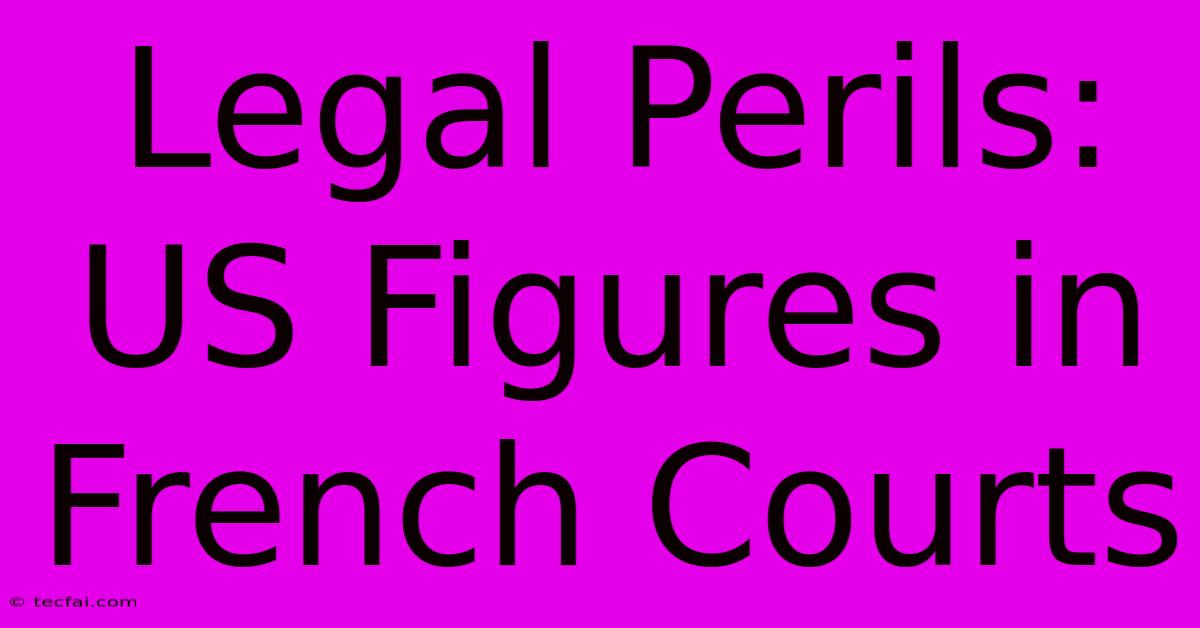Legal Perils: US Figures In French Courts

Discover more detailed and exciting information on our website. Click the link below to start your adventure: Visit Best Website tecfai.com. Don't miss out!
Table of Contents
Legal Perils: US Figures in French Courts
The French legal system, with its distinct civil law traditions and robust enforcement mechanisms, can present unique challenges for US citizens and businesses. While international legal cooperation exists, navigating the complexities of French courts requires a keen understanding of procedural differences and potential legal pitfalls. This article explores the situations that might lead US figures into the French legal system, the potential consequences, and strategies for mitigation.
Why US Figures Face French Courts
Several scenarios can bring US individuals or entities before French judges:
1. Contractual Disputes:
- International Business Transactions: Contracts signed with French companies or individuals are enforceable under French law, regardless of where the contracting parties reside. Disputes over breach of contract, intellectual property rights, or commercial agreements are frequently litigated in French courts, especially if the contract specifies French jurisdiction.
- Online Transactions and E-commerce: The burgeoning digital marketplace has blurred geographical boundaries, leading to increased instances where US companies face legal action in France due to alleged violations of consumer protection laws, data privacy regulations (like GDPR), or other contractual breaches stemming from online interactions with French consumers.
2. Criminal Investigations and Prosecutions:
- International Crimes: Allegations involving crimes like fraud, money laundering, or tax evasion with links to French territory or French citizens can result in investigations and prosecutions within the French justice system, even if the primary actions occurred elsewhere. This is especially pertinent in cases involving significant financial transactions.
- Terrorism and National Security: French courts play a significant role in prosecuting individuals involved in terrorism-related activities, regardless of their nationality, if the acts have a connection to France.
3. Civil Litigation:
- Personal Injury Lawsuits: US citizens involved in accidents or incidents in France can be sued in French courts for damages. The complexities of French tort law and evidentiary standards can present significant hurdles.
- Family Law Matters: Disputes involving custody, divorce, or inheritance, where one party is a US citizen and assets or residency are connected to France, often fall under French family law jurisdiction.
Navigating the French Legal System: Challenges and Strategies
The French legal system differs significantly from the US common law system. Key differences include:
- Inquisitorial System: Unlike the US adversarial system, French courts take a more active role in investigating facts. This means less reliance on witness testimony and more emphasis on documentary evidence and expert opinions.
- Language Barrier: Legal proceedings are conducted in French. Employing proficient legal translators is crucial for effective communication and accurate representation.
- Procedural Rules: Strict adherence to procedural rules is essential. Failure to comply with French court protocols can lead to delays or dismissal of cases.
Strategies for Mitigation:
- Seek Expert Legal Counsel: Engaging a lawyer specializing in both US and French law is paramount. This ensures compliance with all legal requirements and effective representation within the French system.
- Understand Jurisdiction: Careful contract drafting specifying jurisdiction and applicable law can prevent unwanted legal exposure in France.
- International Legal Cooperation: While not always guaranteed, exploring avenues for international legal cooperation between US and French authorities can facilitate evidence gathering and streamline proceedings.
- Insurance Coverage: Review insurance policies thoroughly to determine the extent of coverage for legal expenses and potential liabilities in France.
Conclusion
For US citizens and businesses operating internationally, understanding the potential risks of encountering the French legal system is crucial. Proactive measures, including expert legal advice and careful contract negotiation, are essential in mitigating these risks and ensuring a smoother experience when navigating the complexities of French jurisprudence. Ignoring these precautions can lead to significant legal and financial repercussions.

Thank you for visiting our website wich cover about Legal Perils: US Figures In French Courts. We hope the information provided has been useful to you. Feel free to contact us if you have any questions or need further assistance. See you next time and dont miss to bookmark.
Featured Posts
-
Asahan Ang Ulan Shear Line Sa Luzon Dec 2
Dec 01, 2024
-
Small Business Saturday Its Importance Explained
Dec 01, 2024
-
1967 Chevy Ii Nova Paul Walkers Car
Dec 01, 2024
-
San Jose Beats Abbotsford Canucks
Dec 01, 2024
-
Arizona Small Business Saturday Events
Dec 01, 2024
